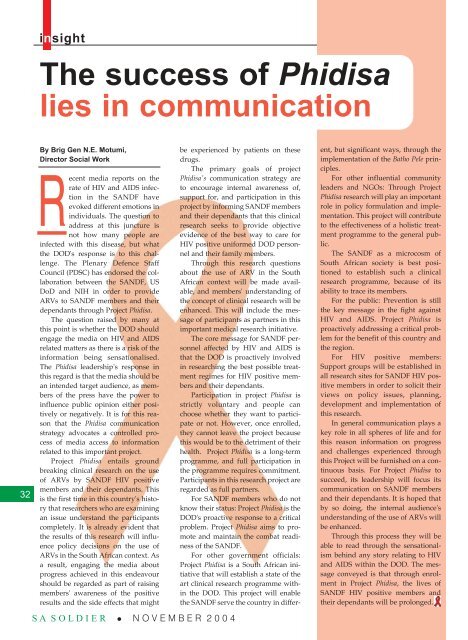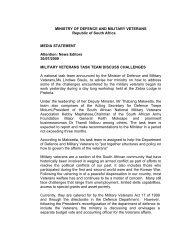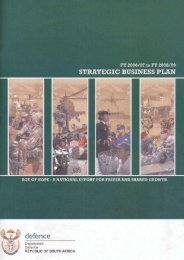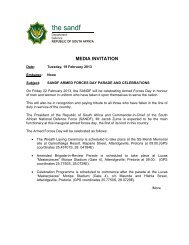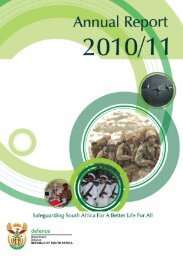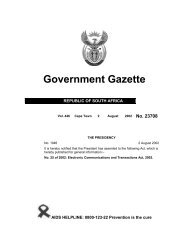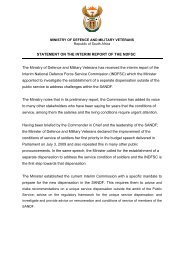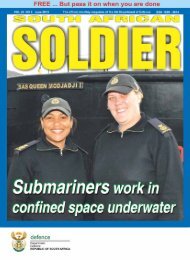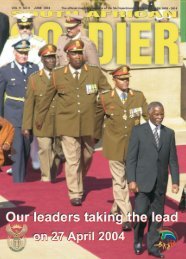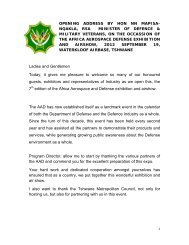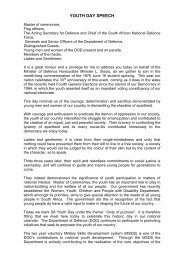November - Department of Defence
November - Department of Defence
November - Department of Defence
- No tags were found...
Create successful ePaper yourself
Turn your PDF publications into a flip-book with our unique Google optimized e-Paper software.
insightThe success <strong>of</strong> Phidisalies in communication32By Brig Gen N.E. Motumi,Director Social WorkRecent media reports on therate <strong>of</strong> HIV and AIDS infectionin the SANDF haveevoked different emotions inindividuals. The question toaddress at this juncture isnot how many people areinfected with this disease, but whatthe DOD's response is to this challenge.The Plenary <strong>Defence</strong> StaffCouncil (PDSC) has endorsed the collaborationbetween the SANDF, USDoD and NIH in order to provideARVs to SANDF members and theirdependants through Project Phidisa.The question raised by many atthis point is whether the DOD shouldengage the media on HIV and AIDSrelated matters as there is a risk <strong>of</strong> theinformation being sensationalised.The Phidisa leadership's response inthis regard is that the media should bean intended target audience, as members<strong>of</strong> the press have the power toinfluence public opinion either positivelyor negatively. It is for this reasonthat the Phidisa communicationstrategy advocates a controlled process<strong>of</strong> media access to informationrelated to this important project.Project Phidisa entails groundbreaking clinical research on the use<strong>of</strong> ARVs by SANDF HIV positivemembers and their dependants. Thisis the first time in this country's historythat researchers who are examiningan issue understand the participantscompletely. It is already evident thatthe results <strong>of</strong> this research will influencepolicy decisions on the use <strong>of</strong>ARVs in the South African context. Asa result, engaging the media aboutprogress achieved in this endeavourshould be regarded as part <strong>of</strong> raisingmembers' awareness <strong>of</strong> the positiveresults and the side effects that mightS A S O L D I E R • N OV EMBER 2 0 0 4be experienced by patients on thesedrugs.The primary goals <strong>of</strong> projectPhidisa's communication strategy areto encourage internal awareness <strong>of</strong>,support for, and participation in thisproject by informing SANDF membersand their dependants that this clinicalresearch seeks to provide objectiveevidence <strong>of</strong> the best way to care forHIV positive uniformed DOD personneland their family members.Through this research questionsabout the use <strong>of</strong> ARV in the SouthAfrican context will be made available,and members' understanding <strong>of</strong>the concept <strong>of</strong> clinical research will beenhanced. This will include the message<strong>of</strong> participants as partners in thisimportant medical research initiative.The core message for SANDF personnelaffected by HIV and AIDS isthat the DOD is proactively involvedin researching the best possible treatmentregimes for HIV positive membersand their dependants.Participation in project Phidisa isstrictly voluntary and people canchoose whether they want to participateor not. However, once enrolled,they cannot leave the project becausethis would be to the detriment <strong>of</strong> theirhealth. Project Phidisa is a long-termprogramme, and full participation inthe programme requires commitment.Participants in this research project areregarded as full partners.For SANDF members who do notknow their status: Project Phidisa is theDOD's proactive response to a criticalproblem. Project Phidisa aims to promoteand maintain the combat readiness<strong>of</strong> the SANDF.For other government <strong>of</strong>ficials:Project Phidisa is a South African initiativethat will establish a state <strong>of</strong> theart clinical research programme withinthe DOD. This project will enablethe SANDF serve the country in differ-ent, but significant ways, through theimplementation <strong>of</strong> the Batho Pele principles.For other influential communityleaders and NGOs: Through ProjectPhidisa research will play an importantrole in policy formulation and implementation.This project will contributeto the effectiveness <strong>of</strong> a holistic treatmentprogramme to the general public.The SANDF as a microcosm <strong>of</strong>South African society is best positionedto establish such a clinicalresearch programme, because <strong>of</strong> itsability to trace its members.For the public: Prevention is stillthe key message in the fight againstHIV and AIDS. Project Phidisa isproactively addressing a critical problemfor the benefit <strong>of</strong> this country andthe region.For HIV positive members:Support groups will be established inall research sites for SANDF HIV positivemembers in order to solicit theirviews on policy issues, planning,development and implementation <strong>of</strong>this research.In general communication plays akey role in all spheres <strong>of</strong> life and forthis reason information on progressand challenges experienced throughthis Project will be furnished on a continuousbasis. For Project Phidisa tosucceed, its leadership will focus itscommunication on SANDF membersand their dependants. It is hoped thatby so doing, the internal audience'sunderstanding <strong>of</strong> the use <strong>of</strong> ARVs willbe enhanced.Through this process they will beable to read through the sensationalismbehind any story relating to HIVand AIDS within the DOD. The messageconveyed is that through enrolmentin Project Phidisa, the lives <strong>of</strong>SANDF HIV positive members andtheir dependants will be prolonged.


